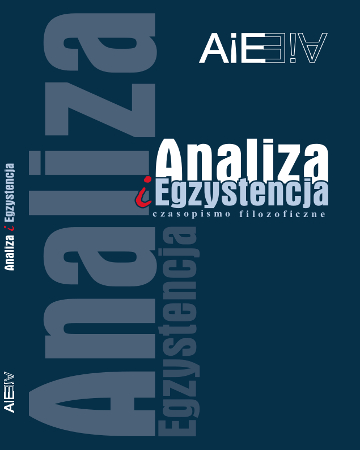
ISSN: 1734-9923
eISSN: 2300-7621
OAI
DOI: 10.18276/aie.2019.46-02





Issue archive /
46 (2019)
Materializm Typu-B i Treść Pojęć Fenomenalnych (Type-B Materialism and the Content of Phenomenal Concepts)
(Type-B Materialism and the Content of Phenomenal Concepts)
| Authors: |
Karol
Polcyn
Uniwersytet Szczecinski |
| Keywords: | consciousness phenomenal concepts two-dimensional semantics conceivability possibility |
| Data publikacji całości: | 2019 |
| Page range: | 15 (25-39) |
Abstract
According to type-B materialism, the corresponding phenomenal and physical concepts are distinct concepts of the same properties. This view is very controversial because of the fact that phenomenal concepts, along with physical concepts, refer non contingently. I discuss three main arguments to the effect that phenomenal concepts cannot refer to physical properties non contingently. I argue that the most challenging is the modal argument. According to this argument, the idea that phenomenal concepts refer to physical properties non contingently is unacceptable, because it leads to the unacceptable view that psychophysical identity statements are both true a posteriori and primarily necessary. I argue that we do not have a satisfactory response to that argument.
Download file
Article file
Bibliography
| 1. | Chalmers, D. (1996). The Conscious Mind: In Search of a Fundamental Theory. Oxford: Oxford University Press. |
| 2. | Chalmers, D. (2002a). Consciousness and Its Place in Nature. W: D. Chalmers (red.), Philosophy of Mind: Classical and Contemporary Readings (s. 247–272). Oxford: Oxford University Press. |
| 3. | Chalmers, D. (2002b). Does Conceivability Entail Possibility? W: T. Gendler, J. Hawthorne (red.), Conceivability and Possibility (s. 145–200). Oxford: Oxford University Press. |
| 4. | Chalmers, D. (2003). The Content and Epistemology of Phenomenal Belief. W: Q. Smith, A. Jokic (red.), Consciousness: New Philosophical Perspectives (s. 220–272). Oxford: Oxford University Press. |
| 5. | Chalmers, D. (2006). Two-Dimensional Semantics. W: E. Lepore, B. Smith (red.), The Oxford Handbook of Philosophy of Language. Oxford: Oxford University Press. |
| 6. | Chalmers, D. (2007). Phenomenal Concepts and the Explanatory Gap. W: T. Alter, S. Walter (red.), Phenomenal Concepts and Phenomenal Knowledge: New Essays on Consciousness and Physicalism (s. 167–194). Oxford: Oxford University Press. |
| 7. | Chalmers, D. (2010). The Two-Dimensional Argument against Materialism. W: D. Chalmers (red.), The Character of Consciousness (s. 141–192). Oxford: Oxford University Press. |
| 8. | Chalmers, D. (2014). Strong Necessities and the Mind-Body Problem: A Reply. Philosophical Studies, 3 (167), 785–800. |
| 9. | Chalmers, D., Jackson, F. (2001). Conceptual Analysis and Reductive Explanation. Philosophical Review, 110, 315–361. |
| 10. | Hill, Ch. (1997). Imaginability, Conceivability, Possibility, and the Mind-Body Problem. Philosophical Studies, 1 (87), 61–85. |
| 11. | Hill, Ch., McLaughlin, B. (1999). There Are Fewer Things in Reality than Are Dreamt of in Chalmers’ Philosophy. Philosophy and Phenomenological Research, 2 (59), 445–54. |
| 12. | Jackson, F. (1982). Epiphenomenal Qualia. The Philosophical Quarterly, 32 (127), 127–136. |
| 13. | Kripke, S. (1980). Naming and Necessity. Cambridge, MA: Harvard University Press. |
| 14. | Levine, J. (2001). The Purple Haze: The Puzzle of Consciousness. Oxford: Oxford University Press. |
| 15. | Levine, J. (2007). Phenomenal Concepts and the Materialist Constraint. W: T. Alter, S. Walter (red.), Phenomenal Concepts and Phenomenal Knowledge: New Essays on Consciousness and Physicalism (s. 145–166). Oxford: Oxford University Press. |
| 16. | Loar, B. (1997). Phenomenal States. W: N. Block, O. Flanagan, G. Güzeldere (red.), The Nature of Consciousness: Philosophical Debates (s. 597–616). Cambridge, MA: MIT Press. |
| 17. | Loar, B. (1999). On David Chalmers’s „The Conscious Mind”. Philosophy and Phenomenological Research, 2 (59), 465–72. |
| 18. | Loar, B. (2003). Qualia, Properties, Modality. Philosophical Issues, 1 (13), 113–29. |
| 19. | Papineau, D. (2002). Thinking about Consciousness. Oxford: Oxford University Press. |
| 20. | Papineau, D. (2007). Phenomenal and Perceptual Concepts. W: T. Alter, S. Walter (red.), Phenomenal Concepts and Phenomenal Knowledge: New Essays on Consciousness and Physicalism (s. 111–144). Oxford: Oxford University Press. |
| 21. | Tye, M. (2008). Consciousness Revisited: Materialism Without Phenomenal Concepts.Cambridge, Mass: MIT Press. |